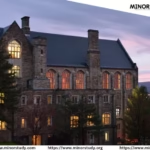🧠 Introduction: A Legacy of Science, Service & Humanity
Named after one of the greatest minds in history, the Albert Einstein College of Medicine in the Bronx, New York, is more than just a medical school—it’s a beacon of hope, science, and social progress. Since its founding in 1955, Einstein College has pushed the boundaries of medical research, healthcare access, and education equity.
- 🧠 Introduction: A Legacy of Science, Service & Humanity
- 🏛️ A Brief History: Born From Vision, Backed by Einstein
- 📅 Timeline: Key Milestones of Einstein College of Medicine
- 🔍 Key Facts at a Glance
- 🌎 Global and National Significance
- 💡 9 Powerful Reasons Why Einstein College of Medicine Stands Out
- 1. 🧠 Research That Changes Lives
- 2. 🌍 Diversity and Inclusion
- 3. 🧪 MD-PhD Program Excellence
- 4. 🏥 Real-World Clinical Training
- 5. 📚 Interdisciplinary Programs
- 6. 🧬 Strong Biomedical Pipeline
- 7. 💙 Focus on Community Medicine
- 8. 🎓 Affordable Education Options
- 9. 🏆 World-Class Faculty
- ❓ Frequently Asked Questions (FAQs)
- 📅 Observances and Campus Culture
- 🌟 Wishing the Future Healers
- 💡 Real-Life Impact
- 🧭 Why It Matters to Society
- 📝 Conclusion: A Legacy That Lives On
- 📌 Key Takeaways
In this human-centered overview, we’ll walk through its storied history, explore major milestones, unpack its research excellence, and celebrate how it shapes the lives of patients, students, and society at large.
🏛️ A Brief History: Born From Vision, Backed by Einstein
Founded: 1955
Location: Bronx, New York
Affiliation: Yeshiva University (1955–2015), now part of Montefiore Health System
Named With Permission: Albert Einstein himself agreed to lend his name, a rare gesture highlighting the school’s high moral and scientific aims.
🎯 Purpose Behind Its Establishment:
Albert Einstein College of Medicine (AECOM) was created with two major goals:
Provide a progressive, inclusive, and socially aware medical education
Advance biomedical science to improve global health
Einstein was the first medical school in the U.S. to admit students without regard to gender, religion, or race, even during a time when discrimination was common in academia.
📅 Timeline: Key Milestones of Einstein College of Medicine
| Year | Milestone |
|---|---|
| 1955 | Officially opens with Albert Einstein’s blessing |
| 1957 | First graduating class |
| 1964 | Starts one of the first MD-PhD Medical Scientist Training Programs |
| 1978 | Discovery of HIV links to Kaposi’s Sarcoma by Dr. Arye Rubinstein |
| 2006 | Montefiore becomes Einstein’s University Hospital |
| 2015 | Becomes part of Montefiore Health System full-time |
| 2020s | Ranked among top U.S. institutions for NIH funding in neuroscience and cancer research |
🔍 Key Facts at a Glance
Full Name: Albert Einstein College of Medicine
Location: Bronx, New York City
Type: Private, not-for-profit medical school
Programs Offered: MD, PhD, MD/PhD, MS in Clinical Research, and Postdoctoral training
Student Body: ~1,000 MD and PhD students
Affiliated Hospitals: Montefiore Medical Center, Jacobi Medical Center
Research Grants: Over $200 million/year in NIH funding
Research Strengths: Cancer, neurology, HIV/AIDS, aging, and global health
🌎 Global and National Significance
Albert Einstein College of Medicine is globally respected for producing:
Cutting-edge research in virology, cardiology, and immunology
Top physicians and physician-scientists
Healthcare leaders who advocate for underserved communities
Its Bronx location also reflects its commitment to real-world healthcare equity—training future doctors in the diverse, complex urban environment of New York City.
💡 9 Powerful Reasons Why Einstein College of Medicine Stands Out
1. 🧠 Research That Changes Lives
AECOM ranks among the top 50 NIH-funded medical schools in the U.S. It has led life-saving studies in HIV/AIDS, Alzheimer’s disease, diabetes, and cancer biology.
2. 🌍 Diversity and Inclusion
From its inception, Einstein has welcomed students from every background, including women, minorities, and international scholars. Today, its campus remains a symbol of equality in medical education.
3. 🧪 MD-PhD Program Excellence
Its Medical Scientist Training Program (MSTP) is one of the oldest and most prestigious in the nation, producing clinician-scientists who both treat and discover.
4. 🏥 Real-World Clinical Training
Students work in top NYC hospitals like Montefiore Medical Center and Jacobi, serving diverse, often low-income populations, giving them unmatched clinical exposure.
5. 📚 Interdisciplinary Programs
Einstein promotes a team-based, interdisciplinary approach to healthcare education—blending public health, neuroscience, ethics, and biomedical innovation.
6. 🧬 Strong Biomedical Pipeline
Home to multiple research centers including:
Institute for Aging Research
Global Diabetes Institute
Einstein-Montefiore Institute for Bioethics
7. 💙 Focus on Community Medicine
Einstein is deeply embedded in its community—offering outreach programs, free clinics, and education for underserved families in the Bronx.
8. 🎓 Affordable Education Options
Through scholarships, research assistantships, and public-private partnerships, many students graduate with less debt than peers at similar schools.
9. 🏆 World-Class Faculty
From Nobel Prize nominees to breakthrough researchers, the Einstein faculty is filled with thought leaders in the sciences and medical humanities.
❓ Frequently Asked Questions (FAQs)
Q1: Is Albert Einstein College of Medicine hard to get into?
Yes. The school has an acceptance rate of less than 5%, with most accepted students having top MCAT scores, strong GPAs, and proven community service.
Q2: What is Einstein known for?
It’s known for its HIV/AIDS research, neuroscience, and socially conscious healthcare model.
Q3: Can international students apply?
Yes, but the preference is given to U.S. citizens and permanent residents. International applicants must meet stringent academic and visa requirements.
Q4: What makes Einstein different from other med schools?
Its mission-driven ethos, deep community connection, and balance of science and social care make it stand out.
Q5: Is Montefiore part of Einstein?
Yes. Montefiore Medical Center is Einstein’s primary teaching hospital and now part of the same organizational structure.
📅 Observances and Campus Culture
Einstein observes many cultural and professional milestones:
White Coat Ceremony
Match Day Celebrations
Student-Led Health Equity Forums
Global Health Symposiums
Community Service Days
These foster a culture of celebration, reflection, and moral responsibility.
🌟 Wishing the Future Healers
🌱 To every aspiring medical student: May your journey be filled with courage, compassion, and curiosity. If you walk through the doors of Albert Einstein College of Medicine, you join a movement for change, for science, and for humanity. 🌱
💡 Real-Life Impact
Here’s how Einstein influences daily life:
🏥 Doctors trained at Einstein serve in urban clinics, research labs, and emergency rooms across the globe
🧪 Research breakthroughs lead to new treatments for aging, infections, and chronic disease
🩺 Outreach initiatives promote preventive care in communities that need it most
🎓 It nurtures doctors who think ethically, act compassionately, and lead courageously
🧭 Why It Matters to Society
Albert Einstein College of Medicine is not just training future doctors—it’s shaping better citizens:
✅ Champions of health equity
✅ Pioneers in medical science
✅ Advocates for social justice
✅ Innovators in ethical healthcare
✅ Healers with a heart and brain
📝 Conclusion: A Legacy That Lives On
In a healthcare system often criticized for being impersonal and profit-driven, Albert Einstein College of Medicine remains a sanctuary of values, compassion, and brilliance. It proves that medical education can still be inspired, human, and revolutionary—just like its namesake.
If you’re seeking a school that builds leaders, not just learners, that prioritizes service as much as science, and that empowers you to heal not just patients but communities, then Albert Einstein College of Medicine may just be your destiny.
📌 Key Takeaways
🎓 Founded in 1955 with Einstein’s blessing
🏆 Top-tier NIH-funded institution
💙 Values-driven and inclusive
🧠 Leaders in research and primary care
🏥 Clinical practice rooted in real-world urban medicine
🌍 Globally relevant, locally impactful








